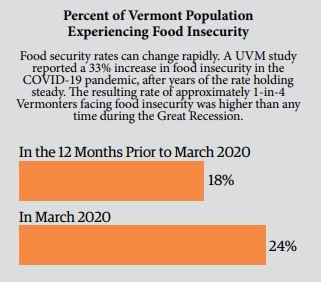

“Food security exists when all people, at all times, have physical, social, and economic access to sufficient, safe and nutritious food that meets their dietary needs and food preferences for an active and healthy life.” All Vermonters have a right to healthy, affordable food, not only today but in times of crisis, regardless of their life circumstances. The COVID-19 pandemic revealed the benefit of a thriving agricultural economy in buffering national food supply chain disruptions, particularly for those already struggling to obtain adequate food. In order to reduce climate and pandemic-related risks to our food security, and to protect the most vulnerable, we need to reorient a significant part of our food production to the regional level. Coordinated, statewide action is needed to ensure food security across Vermont, in times of crisis and times of calm, for every Vermonter.
Household food insecurity is a result of structural socioeconomic factors often beyond the control of individual households, and eliminating it will require a system-level approach to ending poverty and other barriers to healthy food in Vermont. Food insecurity encompasses not only lack of food but the nutritional quality and accessibility of available food. It is one of several important social determinants of physical and mental health, along with housing instability, household energy insecurity, transportation difficulties, and problems accessing affordable healthcare. Vermont’s agricultural economy positions us well to take advantage of local and regional food production as a means of mitigating food insecurity in the present and to feed us during future social disruptions related to climate change, disease outbreaks, and other disasters. However, even where a reliable local and regional food supply exists, it is often unaffordable for many Vermonters, even those who are not counted by the USDA as being food insecure.
During the pandemic, rising need for food assistance, anticipated long-term disruption to food supply chains, and the impact on agricultural and food-related business viability, all illustrated where short and longer-term planning could increase food system resilience. The public food assistance system, which includes programs such as 3SquaresVT, WIC, school meals, and meal programs for older adults, is effective but not adequate to eliminate food insecurity. Tools do exist to help planners and towns with food supply and access planning, but these are newly available, and more training, dissemination, and promotion of food security planning tools are needed. Vermont should ensure that municipal, state and regional plans address the risk of food supply chain disruptions and prepare for emergencies which may arise.
